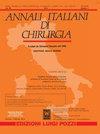Analysis of Influencing Factors of Postoperative Quality of Life in Patients with Renal Cancer under the Continuing Care Model Based on the Omaha System
IF 0.9
4区 医学
Q3 SURGERY
引用次数: 0
Abstract
Background: Scientific nursing is of great significance for improving negative emotions, self-management ability and quality of life of patients after cancer surgery. The Omaha system has been widely used in the field of care in many countries and regions, and although it helps to improve the quality of life of cancer patients after surgery, there are still large differences between different patients. This study examines factors affecting postoperative quality of life in renal cancer patients under the continuous care Omaha system, aiming to refine nursing plans. Methods: We retrospectively analyzed clinical data from 108 renal cancer patients undergoing radical treatment, all of whom received care via the Omaha system. The score for quality of life and the scores for Strategies Used by People to Promote Health (SUPPH), Social Support Rate Scale (SSRS), and Medical Coping Modes Questionnaire (MCMQ) of patients with different baseline data were compared. Results: Patients with spouses as primary caregivers scored higher across psychological, physical, physiological, and societal dimensions of quality of life than those with children or others as caregivers (p < 0.001). Patients without underlying diseases have higher physiological, societal dimensions, overall satisfaction total score for quality of life (compared to those with underlying diseases, p < 0.001), patients with clinical stage III have lower physiological, societal dimensions, overall satisfaction, and total score for quality of life (compared to stage I/II, p < 0.001). The physiological, societal dimensions, overall satisfaction, and total quality of life score for patients with medical or commercial insurance as the settlement method for medical expenses are higher (compared to self-funded, p < 0.001). In the SUPPH scale, the positive attitude score, stress reduction score, making decisions score, and total score were positively correlated with the total score for quality of life (p < 0.001, p < 0.001, p = 0.008, p < 0.001, respectively). In the SSRS scale, the objective support score, subjective support score, useless support score, and total score were positively correlated with the total score for quality of life (all p < 0.001). In the MCMQ scale, the confrontation score was positively correlated with the total score for quality of life (p < 0.001). The acceptance-resignation and avoidance scores were negatively correlated with the total score for quality of life (p < 0.001). Conclusion: The quality of life of patients is not only affected by primary caregivers, underlying diseases, clinical staging, and medical expense settlement methods, but also positively correlated with self-efficacy and social support, and negatively correlated with coping styles.基于奥马哈系统的持续护理模式下肾癌患者术后生活质量的影响因素分析
背景:科学护理对改善肿瘤术后患者的负性情绪、提高自我管理能力和生活质量具有重要意义。奥马哈系统已在许多国家和地区的护理领域得到广泛应用,虽然有助于提高癌症患者术后的生活质量,但不同患者之间仍存在较大差异。本研究探讨持续护理奥马哈系统下肾癌患者术后生活质量的影响因素,旨在完善护理方案。研究方法我们回顾性分析了 108 例接受根治性治疗的肾癌患者的临床数据,所有患者均通过奥马哈系统接受护理。比较了不同基线数据患者的生活质量得分以及促进健康策略(SUPPH)、社会支持率量表(SSRS)和医疗应对模式问卷(MCMQ)得分。结果显示以配偶为主要照顾者的患者在心理、身体、生理和社会生活质量方面的得分均高于以子女或他人为照顾者的患者(P < 0.001)。无基础疾病的患者在生理、社会维度、生活质量总体满意度总分方面得分较高(与有基础疾病的患者相比,P < 0.001),临床Ⅲ期患者在生理、社会维度、总体满意度和生活质量总分方面得分较低(与Ⅰ/Ⅱ期患者相比,P < 0.001)。以医疗保险或商业保险作为医疗费用结算方式的患者的生理、社会维度、总体满意度和生活质量总分较高(与自费相比,P < 0.001)。在 SUPPH 量表中,积极态度得分、减压得分、决策得分和总分与生活质量总分呈正相关(分别为 p < 0.001、p < 0.001、p = 0.008、p < 0.001)。在 SSRS 量表中,客观支持得分、主观支持得分、无用支持得分和总分与生活质量总分呈正相关(均 p <0.001)。在 MCMQ 量表中,对抗得分与生活质量总分呈正相关(p < 0.001)。接受-辞职和回避得分与生活质量总分呈负相关(P < 0.001)。结论患者的生活质量不仅受主要护理人员、基础疾病、临床分期和医疗费用结算方式的影响,还与自我效能感和社会支持正相关,与应对方式负相关。
本文章由计算机程序翻译,如有差异,请以英文原文为准。
求助全文
约1分钟内获得全文
求助全文
来源期刊
CiteScore
0.90
自引率
12.50%
发文量
116
审稿时长
>12 weeks
期刊介绍:
Annali Italiani di Chirurgia is a bimonthly journal and covers all aspects of surgery:elective, emergency and experimental surgery, as well as problems involving technology, teaching, organization and forensic medicine. The articles are published in Italian or English, though English is preferred because it facilitates the international diffusion of the journal (v.Guidelines for Authors and Norme per gli Autori). The articles published are divided into three main sections:editorials, original articles, and case reports and innovations.

 求助内容:
求助内容: 应助结果提醒方式:
应助结果提醒方式:


